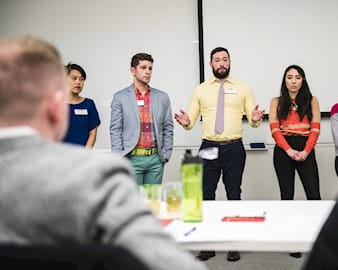How does a marketing lab course differ from a traditional course?
For all marketing lab courses, students must apply and be accepted. Students are divided into groups and work with a company-as-client on a project.
For Lab in Developing New Products and Services, practitioners serve as coaches. While a background in marketing is a plus for the Digital Marketing Lab, it is not required. In both these courses, students meet with clients as a student advisory team, helping them to develop consulting skills.
Algorithmic Marketing Lab is part of a two-course sequence. It is preceded by Digital and Algorithmic Marketing, which introduces topics related to algorithmic marketing. The lab course is a more in-depth, hands-on project-based class that requires students to formulate and implement a working algorithmic product.
What can students expect in the lab and how will it prepare them for the next step in their careers?
Professor Middlebrooks emphasizes that these labs greatly prepare students for what’s to come, and says students “get a taste of what it would be like to work in a product innovation role and replicate the process as closely as possible.”
Professor Mohan describes the objective of his lab as “[developing] a core part of the necessary practical background for those students who are looking to grow as industry professionals in marketing. [Students] develop a better sense for what it really takes to design and execute digital marketing strategies and campaigns on [their] own.”
Professor Misra says students will “get a taste of what it is to work on designing, creating, and implementing an algorithmic product that uses data and machine learning to make scalable marketing decisions.”
Students often provide feedback that as product managers and associate brand managers, they felt the lab work was extremely relevant to their careers and that they were very prepared to succeed in their internships and full-time roles across CPG, tech, and other industries.
How do students and companies benefit from Booth’s lab courses?
These course projects have long-term effects and high-profit potential for the company sponsors and give students an exploratory space to work outside the box.
When Carrie Sweeney, '11, then a Senior Partner Manager at Pinterest, sponsored a lab project, the company was looking to give pinners (Pinterest users) the information they sought while simultaneously helping marketers reach an eager audience. After digging into the data and consumer behavior, students recommended that Pinterest add a feature allowing pinners to toggle between two modes in the app. In shopping mode, pinners could click on products to find out where to buy those products—an opportunity for marketers. In browsing mode, pinners could turn off the shopping features and simply explore. The students forecast that adding a shopping mode would produce $12 million in profits annually.
Alex Ward, '08, then Global Lead of Special Projects at Airbnb, describes the marketing lab as a win-win for students and companies, especially in light of the fast pace of change and company growth in the tech sector. “The students worked with us to think creatively about how we could build a research and survey structure to uncover really valuable data for our operators and to develop new solutions. They get real-world exposure, and we get to work with the smart, scrappy, entrepreneurial [Boothies].”
How have students leveraged lab class insights/experiences?
Whether students come from a marketing background or are looking to make a career switch, working with clients in the classroom helps students address their personal and professional development.
Alex Sotiropoulos, an Evening student, was looking for help pivoting from communications to brand management for consumer packaged goods. He says, “I’d never previously worked in a brand marketing or innovation function, so I was craving hands-on experience before making the switch.”
Olivia Lee, a Full-Time student, was surprised that just a few conversations with sports fans could uncover so much about consumer needs. “Especially in moderated interviews, in which we could push people to really discuss the ‘why’ behind their responses, it was interesting to learn what drives sports fandom and what kinds of experiences make an event truly memorable,” she says.
Erika Gomez, another Full-Time student and Booth Technology Group co-chair, says, “My team had the opportunity to work with the Dropbox PMM team and was tasked with developing recommendations for improving the company's storage plan for families. We went through the design thinking process, which included conducting user interviews to identify the core customer needs, prioritizing those needs, and ideating solutions for the top needs. During my internship I had to go through a similar process to identify ways to improve the shoppable video experience on Instagram and I felt incredibly prepared to take this on.
Learn more
The marketing curriculum features a robust selection of courses around strategy, tools, and decision making. See a rundown of the marketing curriculum at Booth. Interested in learning more about marketing labs? Read more about the benefits here.

